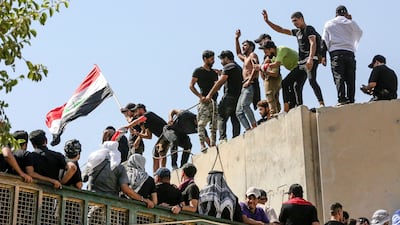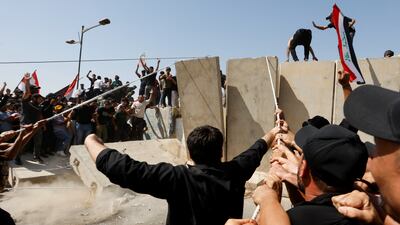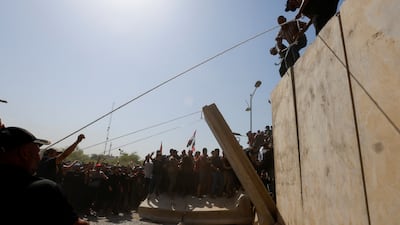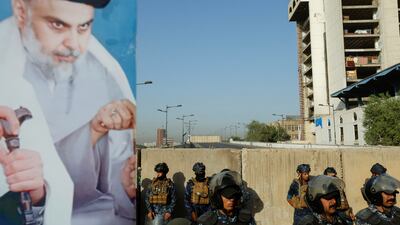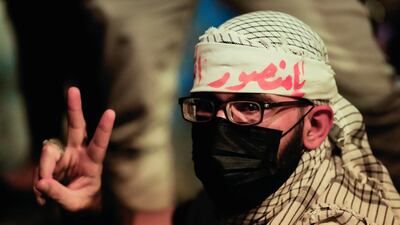Iraq's caretaker Prime Minister Mustafa Al Kadhimi made a plea for dialogue and concessions among political parties on Saturday after supporters of Shiite cleric Moqtada Al Sadr stormed parliament for the second time in days to oppose a rival bloc's prime ministerial candidate.
Iraq “is going through a very sensitive situation”, Mr Al Kadhimi said in a televised speech calling for political rivals to show restraint.
"The dilemma is political and its solution is political. A solution is possible through sincere, constructive dialogue and making concessions for Iraq and Iraqis,” Mr Al Kadhimi said.
Tensions have risen in the past week after a coalition of Shiite parties, the Co-ordination Framework, nominated Mohammed Al Sudani, a veteran politician aligned with former prime minister Nouri Al Maliki, to lead Iraq's next government.
Mr Al Sadr has described Mr Al Sudani as a “shadow” of Mr Al Maliki, with whom he has had a years-long rivalry.
Mr Al Maliki and the parties backing Mr Al Sudani are considered to be close to Iran, whose influence in Iraq Mr Al Sadr opposes.
Thousands of the cleric's followers broke through concrete barricades on Saturday morning and entered the parliament building in Baghdad's high-security Green Zone where state institutions and foreign embassies are located.
Security forces fired tear gas and used water cannon but were unable to stop the protesters. At least 100 protesters and 25 security personnel were injured, the health ministry said.
By early afternoon, officials from the cleric's Sadrist movement announced that the protesters in parliament would be staging a sit-in, and called for supporters to send food and water.
They also asked some of his followers to march to the headquarters of the Supreme Judiciary Council, also in the Green Zone.
The Co-ordination Framework responded by calling for its supporters to stage “peaceful demonstrations to defend the state, its legitimacy and institutions, on top of them the judiciary authority”.
The demonstrations are “to face the dangerous violation against the law and the norms”, it said, without specifying when or where they should be held.
Mr Al Kadhimi urged Iraqis not to be drawn into confrontation.
“One thousand days of calm dialogue better than a moment in which a drop of Iraqi blood is shed,” he said.
“We must all co-operate to stop those who are stepping up this sedition, and everyone must know very well that the fire of sedition will burn everyone.”
His speech followed a message issued earlier after protesters entered the Green Zone, calling for them to remain calm and co-operate with security forces.
“Political escalation will increase the tension in the street and that will not serve the public interest,” he said.
Parliament Speaker Mohammed Al Halbousi, a Sunni politician allied with Mr Al Sadr, also called for the protesters to remain peaceful.
The UN mission to Iraq said the “ongoing escalation is deeply concerning” and called for calm.
“Voices of reason and wisdom are critical to prevent further violence,” it said.
“All actors are encouraged to de-escalate in the interest of all Iraqis.”
Mr Al Sadr began rallying his followers after the Co-ordination Framework announced Mr Al Sudani's nomination on Monday.
They entered the Green Zone and briefly occupied Parliament on Wednesday, chanting slogans against Iran, endemic corruption and a political stalemate that has prevented the formation of a new government since a general election last October.
Protesters who entered Parliament on Saturday chanted “Yes, yes for the Sayyed, the leader”, using the honorific for descendants of Prophet Mohammed.
A video posted online by one of the protesters sent a message to Mr Al Maliki and Brig Gen Esmail Qaani, commander of Quds Force in Iran’s Islamic Revolutionary Guard Corps.
“To Nouri Al Maliki, we say: we will shave your moustache along with Qaani, as well as those who are with you or support you,” he said, referring to a form of public shaming.
Brig Gen Qaani has been travelling between Tehran and Baghdad for months to expedite the formation of Iraq's next government.
His most recent visit to Baghdad was on Wednesday, when he met Iran-backed Iraqi and Kurdish politicians.
It was not clear whether he was still in Iraq.
Although Mr Al Sadr's alliance won the most seats in October’s election, he withdrew his MPs from Parliament and abandoned talks on forming a government after several unsuccessful attempts to muster support for a presidential nominee.
To form a new government, Parliament must first to elect Iraq's new president, who in turn will ask the nominee of the largest bloc in parliament to form the government.
Since president's post is reserved for the Kurds — based on an unofficial agreement among Iraq’s political parties since 2003, the Co-ordination Framework has to wait until the Kurds agree on a nominee.
However, the two main Kurdish political parties, the Kurdistan Democratic Party and Patriotic Union of Kurdistan, are both considering the post of president but have been unable to reach an agreement.
The KDP has aligned itself with Mr Al Sadr, while the PUK is closer to Iran-backed factions.























